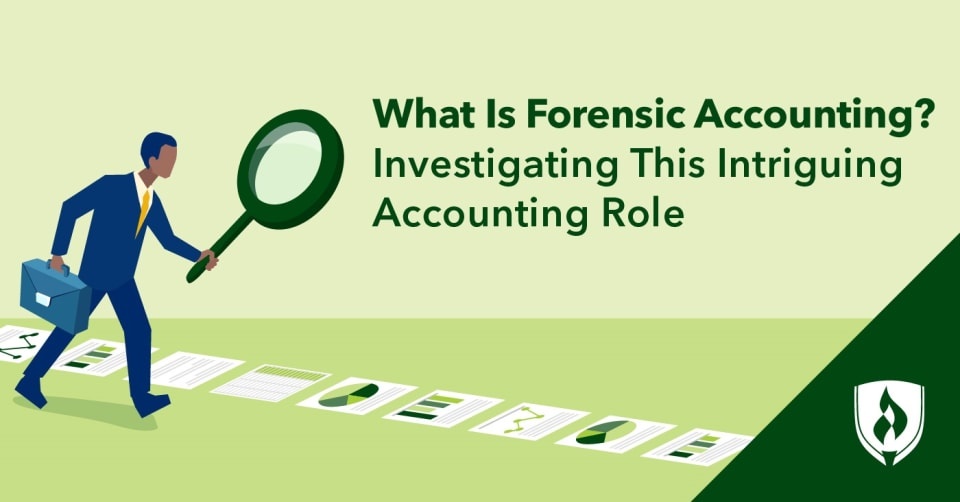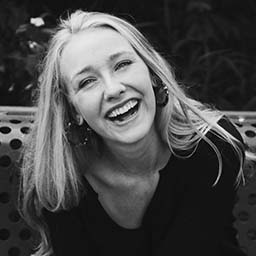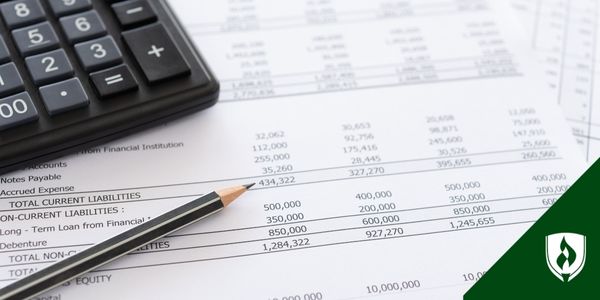What Is Forensic Accounting? Investigating This Intriguing Accounting Role
By Kalie Debelak on 10/31/2022

You’re interested in business, working with numbers and problem solving. You’re pretty certain that a career in accounting might be a great fit for your analytical eye, but you want to feel like you’re doing more than crunching numbers while still making your way to earning a solid living. You love the stability an accounting role offers you and don’t want to sacrifice that for your desire to do something a little bit out of the box. Good news! Here’s a career just for you—look no further than one of accounting’s niche specialties, forensic accounting.
So, what is forensic accounting? Unlike other business-focused careers, forensic accountants get to use their skills to play the role of Sherlock, uncovering financial discrepancies alongside large corporations and law enforcement. Interested? Keep reading to see if a career in forensic accounting is for you.
What is forensic accounting?
Forensic accounting marries analytical and investigative skills with a knack for numbers. In this role, you need a probing mind and a sound understanding of financial law. Forensic accountants are a type of accountant usually employed by law enforcement agencies, law firms or large businesses to investigate financial activity such as errors, omissions and fraudulent charges.
In addition to identifying errors in financial records, forensic accountants evaluate records to ensure compliance with financial laws and standards. These accountants can be essential to investigations, sometimes serving as expert witnesses in court proceedings.
It is important to distinguish between forensic accounting, financial auditing and fraud auditing. According to the National Association of Forensic Accountants (NAFA), the objective of a financial audit is to determine whether the information in financial statements is presented in congruence with generally accepted accounting principles (GAAP).1
The purpose of a fraud audit is to evaluate how likely it is that fraud would be detected and/or prevented. These usually occur as a preventative measure, unlike fraud investigations which happen after fraud is suspected to have occurred. This is where a forensic accountant comes in. Instead of ensuring reports are up to standards, forensic accountants are employed to follow a (oftentimes digital) paper trail to confirm and endorse the settlement or claim presented by the client. This can include measures like recovering and analyzing deleted digital records that may reveal what’s truly going on with suspect financial information and the intent behind those involved.
Who hires forensic accountants?
Forensic accountants can work in both the public and private sectors. Forensic accountants might work for large corporations to identify and prevent internal fraud. They could also work for federal law enforcement agencies such as the Federal Bureau of Investigation® or the Internal Revenue Service (IRS®) to uncover larger-scale financial crimes.
Additionally, forensic accountants may be employed by law firms for investigating civil legal matters—for example, ensuring all financial assets are accounted for and unobscured when working through the legal proceedings of a divorce or lawsuit.
Experience and education needed for forensic accountants
If you are interested in becoming a forensic accountant, you will need to earn a bachelor’s or master’s degree in accounting, finance or forensic accounting.
Experience is also a critically important factor for most aspiring forensic accountants. While education and certifications can certainly expose you to applicable theories and concepts, there’s a lot of value in having practical accounting and financial reporting experience. Think of it this way—when you thoroughly understand accounting practices that are above board, you’ll have better insight into areas where bad actors may cut corners or where potential weak points can be found. That’s something that can only be refined with practice.
Working at a small- or medium-sized firm can provide excellent exposure and insight into the big picture of how accounting and financial operations are conducted, how to communicate tactfully with clients and more. Additionally, internal audit roles can be a great jumping-off point for forensic accountants, as they help refine some of the investigative skills required for forensic accounting.
Do I need to be a CPA to be a forensic accountant?
While it is not necessarily a requirement to be a Certified Public Accountant (CPA) to be a forensic accountant, it can certainly help. According to Ted Capwell, forensic accountant and co-founder of Safe Trade Binary Options, pursuing additional credentials such as the Certified in Financial Forensics (CFF®) or Certified Fraud Examiner (CFE®) can enhance your profile and help bolster your qualifications for becoming a forensic accountant.
What are some potential pros and cons of working in forensic accounting?
To start, it’s investigative work—and that’s inherently interesting as no two cases are the same. At face value, this work may not have quite the same level of flashy intrigue as that of a detective investigating a murder, but there’s still plenty that keeps the work of a forensic accountant engrossing. Looking for a metaphorical thread to pull and seeing where that takes you can be truly fascinating as you work to discover what really happened in a suspect financial scenario.
"What makes the work interesting to me is building a story out of numbers and uncovering crimes like a detective"
“What makes the work interesting to me is building a story out of numbers and uncovering crimes like a detective,” Capwell says.
Additionally, there’s a human element that keeps this work interesting. Forensic accountants have an opportunity to interview and interact with suspected wrongdoers, and there’s a little thrill that comes with knowing you’ve likely caught someone in a lie.
Of course, there’s also a lot of work that goes into the lead-up to these “checkmate” moments. Poring over huge amounts of financial documentation can undoubtedly be a tedious task during an investigation.
Taking the stand in court as an expert witness can also be a challenging experience. Your work will likely be heavily scrutinized and navigating how to answer lines of questioning is not always easy. You’ll need to be able confidently and clearly report your findings in this role, and that can be intimidating for some.
Is accounting right for you?
Forensic accounting provides an intriguing niche option for would-be accountants to aspire to. Like with other accounting roles, there are elements of investigation, analysis and numerical know-how blended together. It’s also easy to see the appeal when you factor in the intrigue of potentially contributing to a criminal investigation.
Of course, this role is just one option among many within the accounting field. If you’re weighing whether pursuing an accounting career is worth it, check out our article “10 Must-Know Pros and Cons of an Accounting Career” for more insight into the accounting field.
1“Forensic Accounting,” National Association of Forensic Accountants, 2007, [accessed September 2022], https://www.nafanet.com/index_files/forensicaccounting.htm.
Federal Bureau of Investigation is a registered trademark of the United States government.
Internal Revenue Service is a registered trademark of the United States government.
Certified Financial Forensics (CFF) is a registered trademark of American Institute of Certified Public Accountants.
Certified Fraud Examiner (CFE) is a registered trademark of Association of Certified Fraud Examiners, Inc.




